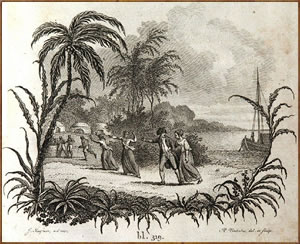De Engelse schrijver Bruce Chatwin werd op 13 mei 1940 in Sheffield geboren.
Uit: Bruce Chatwin (Biografie door Nicholas Shakespeare)
“For two days Bruce engaged Brain in conversations which he described as “the most stimulating discussions in my life”. They spoke of Birmingham, where Bruce had grown up and from where Brain’s father, finding England restrictive, had departed for the Cape. They spoke about Brain’s son Ted, who died at 14 months when he choked on a piece of apple, teaching Brain—painfully—to live his life as though each day might be his last. And they spoke of the origin of evil. Bruce seized on Brain’s discoveries to support his conviction that human beings were “not that bad” and that the predator instinct was not essential to our nature. If the leopard-like cat had preyed on our ancestors, then man in his origins was not necessarily aggressive. He lived his life in fear, dinofelis watching him from the shadows.
Bruce—who called the cat “the Prince of Darkness”—amused the older man. Brain says, “He understood ’the Prince of Darkness’ as a psychological necessity. He thought we had lived so long with prowling nocturnal predators they had become part of our make-up. When we no longer had these animals in bodily form, we invented dragons and heroes who went off to fight them.” Discussing, for instance, Uccello’s painting of St. George in the act of lancing the dragon, Bruce seemed to think this was an illustration of what had actually happened. Brain had misgivings about this nostalgia for “the Beast we have lost”. Nevertheless, it excited him to watch Bruce take his work and run with it. “Chatwin was like a nineteenth-century synthesiser,” says Brain. “There is a place again for that kind of generalist, someone who can wander among specialised fields and pull things together. Otherwise it’s very compartmentalised and syntheses don’t really occur.” The two men talked late into the night and on the following day they drove to the cave at Swartkrans.“

De Britse schrijfster Daphne du Maurier werd geboren in Londen op 13 mei 1907.
Uit: The Birds
„The wind seemed to cut him to the bone as he stood there, uncertainly, holding the sack. He could see the white-capped seas breaking down under in the bay. He decided to take the birds to the shore and bury them…
He crunched his way over the shingle to the softer sand and then, his back to the wind, ground a pit in the sand with his heel. He meant to drop the birds into it, but as he opened up the sack the force of the wind carried them, lifted them, as though in flight again, and they were blown away from him along the beach, tossed like feathers, spread and scattered, the bodies of the fifty frozen birds…The dead birds were swept away from him by the wind…He looked out to sea and watched the crested breakers, combing green…
Then he saw them. The gulls. Out there, riding the seas.
What he had thought at first to be the white caps of the waves were gulls. Hundreds, thousands, tens of thousands… They rose and fell in the trough of the seas, heads to the wind, like a mighty fleet at anchor, waiting on the tide. To eastward and to the west, the gulls were there. They stretched as far as his eye could reach, in close formation, line upon line. Had the sea been still they would have covered the bay like a white cloud, head to head, body p
acked to body.“
(…)
At the top of the hill he waited. He was much too soon. There was half an hour still to go. The east wind came whipping across the fields from the higher ground. He stamped his feet and blew upon his hands. In the distance he could see the clay hills, white and clean, against the heavy pallor of the sky. Something black rose from behind them, like a smudge at first, then widening, becoming deeper, and the smudge became a cloud, and the cloud divided again into five other clouds, spreading north, east, south and west, and they were not clouds at all; they were birds.“
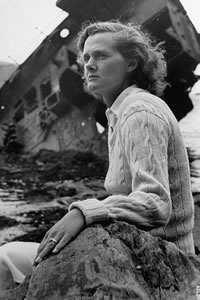
De Schotse dichteres Kathleen Jamie werd geboren op 13 mei 1962 in Currie, Edinburgh.
Glamourie
When I found I’d lost you –
not beside me, nor ahead,
nor right nor left not
your green jacket moving
between the trees anywhere,
I waited a long while
before wandering on: no wren
jinked in the undergrowth,
not a twig snapped.
It was hardly the Wildwood,
just some auld fairmer’s
shelter belt, but red haws
reached out to me,
and between fallen leaves
pretty white flowers bloomed
late into their year. I tried
calling out, or think
I did, but your name
shrivelled on my tongue,
so instead I strolled on
through the wood’s good
offices, and duly fell
to wondering if I hadn’t
simply made it all up: you,
I mean, everything,
my entire life….either way,
nothing now could touch me
bar my hosts, who appeared
as diffuse golden light,
as tiny spiders
examining my hair….
what gratitude I felt then –
I might be gone for ages,
maybe seven years!
-and such sudden joie de vivre
that when a ditch gaped
right there instantly in front of me
I jumped it, blithe as a girl –
ach, I jumped clear over it,
without even pausing to think.
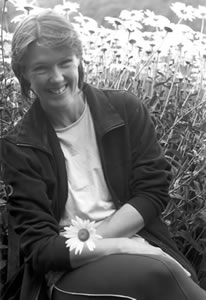
De Amerikaanse schrijver Armistead Jones Maupin Jr. werd geboren op 13 mei 1944 in Washington.
Uit: The Night Listener
„So Boyd sent them photographs. The bride turned out to be an aristocrat of the highest caste, better bred by far than any member of Boyd’s family. The couple had been wed in regal splendor, perched atop a pair of jewelled elephants. Boyd’s parents, imprisoned in their middle-class snobbery, had managed to miss the social event of a lifetime.
I had told that story so often that Jess knew it by heart. So when Boyd came to town on business and met Jess for the first time, Jess was sure he had the perfect opener. “Well,” he said brightly, “Gabriel tells me you got married on an elephant.”
Boyd just blinked at him in confusion.
I could already feel myself reddening. “You weren’t?”
“No,” Boyd said with an uncomfortable laugh. “We were married in a Presbyterian church.”
Jess said nothing, but he gave me a heavy-lidded stare whose meaning I had long before learned to decipher: You are never to be trusted with the facts.
In my defense, the essence of the story had been true. Boyd had indeed married an Indian girl he had met in the Peace Corps, and she had proved to be quite rich. And Boyd’s parents-who were, in fact, exceptionally stuffy – had always regretted that they’d missed the wedding.
I don’t know what to say about those elephants, except that I believed in them utterly. They certainly never felt like a lie. More like a kind of shorthand for a larger, less satisfying truth. Most stories have holes in them that cry out for jewelled elephants. And my instinct, alas, is to supply them.“
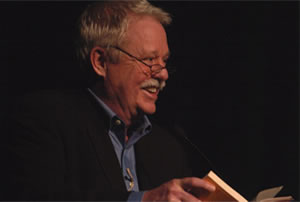
Zie voor alle bovenstaande schrijvers ook mijn blog van 13 mei 2007 en ook mijn blog van 13 mei 2008 en ook mijn blog van 13 mei 2009.
De Oostenrijkse schrijver en acteur Gregor von Rezzori werd geboren op 13 mei 1914 in Czernowitz. Zie ook mijn blog van 13 mei 2009.
Uit: Denkwürdigkeiten eines Antisemiten
»Skutschno« ist ein russisches Wort, das sich ins Deutsche schwerlich übersetzen läßt. Es bedeutet mehr als öde Langeweile: eine seelische Leere, deren Sog wie eine unbestimmte, aber heftig drängende Sehnsucht wirkt.
Als ich dreizehn war und in dem Alter, das im Sprachgebrauch der damaligen Erzieher »die Flegeljahre« hieß, fanden meine Eltern sich am Ende ihrer Weisheit. Wir lebten in der Bukowina, einer heute fast astronomisch fernen Provinz im europäischen Südosten – aber was ich hier erzähle, erscheint nicht nur räumlich, sondern auch zeitlich so weit entrückt, als hätte ich’s nur geträumt. Dabei beginnt’s als eine Allerweltsgeschichte.
Von den Schulen des damaligen Königreichs Rumänien, dessen Bürger wir durch den Zusammenbruch der k.u.k. Monarchie nach dem Ersten Weltkrieg geworden waren, fand ich mich durch ein »consilium abeundi« ausgeschlossen. Der Versuch, in einem Internat in Österreich, das meine Angehörigen immer noch als unsere kulturelle Heimat auffaßten, die Unausgeglichenheiten meines Charakters durch strenge Disziplin zu harmonisieren, hätte beinah zum gleichen schändlichen Ende geführt. Nur ein rechtzeitiger, vorgeschützt freiwilliger Abgang von der Anstalt verhinderte mein endgültiges Ausscheiden aus der Gruppe der Privilegierten, denen der Weg zur höheren Bildung offenstand. Ich war – wieder nach dem damaligen Sprachgebrauch derjenigen, welchen die verantwortungsvolle Aufgabe zugefallen war, Menschenkinder zu »nützlichen Mitgliedern der Gesellschaft« zu erziehen – ein »ziemlich hoffnungsloser Fall. Meine Eltern, blind dafür, in welchem Ausmaß das Widersprüchliche in mir aus der spannungsvollen Verschiedenheit ihrer beider Wesensart gewachsen war, stimmten mit den Schulmeistern überein, daß aus einer solchen Mischung von neurotischer Sensibilität und Neigung zur Gewalttätigkeit, wacher Auffassungsgabe und stumpfer Lernunfähigkeit, zärtlichem Anlehnungsbedürfnis und mangelndem Anpassungsvermögen eigentlich nur das Kriminelle sich entwickeln konnte.”
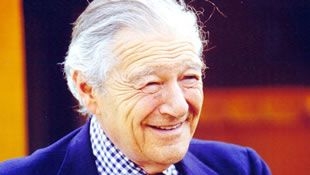
De Nederlandse dichter en godsdiensthistoricus Theo van Baaren werd op 13 mei 1912 geboren in Utrecht. Zie ook mijn blog van 13 mei 2007 en ook mijn blog van 13 mei 2008 en ook mijn blog van 13 mei 2009.
Luister naar de stemmen van het water
Luister naar de stemmen van het water.
In ’t water rust de wijsheid van de aarde.
Vuur is schoon, maar bedriegt de zinnen.
Water woont met nacht in droomtijd samen.
Laat het water langs je oren ruisen.
Sluit je ogen toe en wees tevreden.
Nevel is een functie van het licht.
In de nacht spreekt water luid en helder.
Bij de aanlegsteiger aan het einde
glanst, ook in het diepste duister, ’t water,
spiegel van de ogen van de dood.

Zie voor nog meer schrijvers van de 13e mei ook mijn vorige blog van vandaag.



